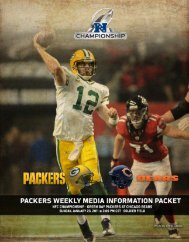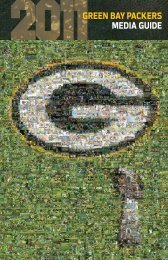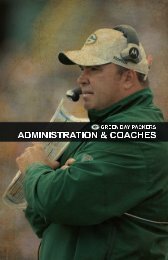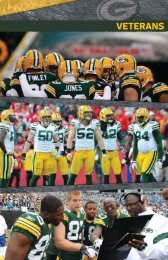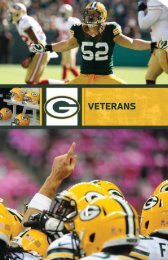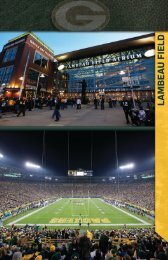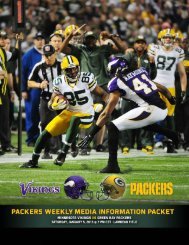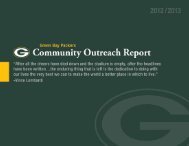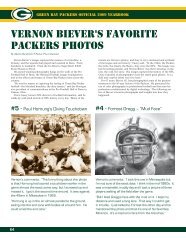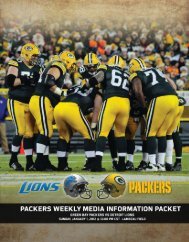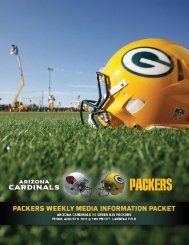THE PACKERS STORYCOMMUNITYADMIN. &COACHESVETERANSDRAFT &FREE AGENTS2012 REVIEWPACKERSSTORYLAMBEAUFIELDMISC.consecutive home wins in the final two weeks, and secured the sixthand final seed in the NFC’s playoff bracket.Taking to the road for the NFC playoffs, the Packers started bybottling up the explosive Eagles’ offensive attack and winning theopening-round Wild Card game at Philadelphia by a score of 21-16.The task wouldn’t get any easier the following week as they traveled toAtlanta to take on the No. 1-seeded Falcons. After an initial back andforth, Green Bay exploded with a 28-point second quarter and neverlooked back. On the strength of a near-flawless display of quarterbackingby Rodgers, and two crucial interceptions by Williams, the Packershammered the Falcons 48-21, the second-largest margin of victory inteam postseason history.For the NFC Championship, the Packers faced their division rival,the Chicago Bears, for a chance to return to the Super Bowl for thefirst time since the 1997 season. Despite the rich, 182-game historyof the rivalry, the game marked just the second-ever meeting betweenthe two teams in the postseason. On a 20-degree afternoon at SoldierField, the Packers got out to a 14-0 lead early in the second quarter.The opportunistic defense forced three Chicago turnovers, highlightedby an improbable 18-yard interception return for a touchdown byRaji that put Green Bay ahead 21-7 late in the fourth quarter. Rookiecornerback Sam Shields sealed the 21-14 win on the Bears’ final drive,making his second interception of the game to send the franchise toits fifth Super Bowl.The Super Bowl pitted the Packers against the AFC championPittsburgh Steelers. In what was billed as a matchup between tworenowned 3-4 defenses, it was the Green Bay offense, led onceagain by the exceptionally precise Rodgers, that was the difference.The Packers stormed out to a 21-3 lead in the first half, with twotouchdowns <strong>com</strong>ing off the arm of Rodgers and one on an interceptionreturn by Collins. Under circumstances reflective of the entireseason, the Packers were forced to over<strong>com</strong>e injuries, as veteranstalwarts Driver and Woodson were both ruled out of the game latein the first half.The Steelers fought their way back, but a forced fumble byMatthews at the start of the fourth quarter led to another Rodgerstouchdown pass. Forcing a turnover on downs on Pittsburgh’s finaldrive, the Packers won the franchise’s fourth Super Bowl, 31-25.In the months that followed the season, both Thompson andMcCarthy were rewarded with multi-year contract extensions that willkeep them in Green Bay for the foreseeable future.With an unquestioned franchise quarterback, a nucleus of youngveterans, and a roster even further bolstered by the return of injuredplayers and a 10-man draft class, all eyes were set on the quest foranother world title in 2011.Due to a league-wide work stoppage that began in early March,the Packers – like the rest of the other clubs – were deprived of anoffseason program that would have fostered continued developmentand the integration of newly selected rookie players. The ongoing labornegotiations meant that the players first convened as a team at thestart of training camp in late July. With an abbreviated training campschedule and a bull’s-eye affixed firmly to their backs as the reigningchampions, the Packers would have to rely on their stable roster andestablished schemes to help pick up where the team had left off at itspeak in early February.And that they did. Beginning with the <strong>NFL</strong>’s season-openingThursday night spectacle against the high-powered New OrleansSaints at Lambeau Field, the Packers stormed through the regularseason, reeling off a team-record 13 consecutive wins en route toa franchise-best 15-1 record. The team became just the sixth in<strong>NFL</strong> history to reach the 15-win plateau, and when <strong>com</strong>bining thestart of 2011 with the six wins that closed out 2010, the 19-gamewinning streak was the longest in team history and second longestin league annals.The franchise laid claim to its first NFC North division title since2007 and secured the conference’s No. 1 seed for the playoffs.Throughout the season, the recipe for success was written by Rodgersand a prolific offense that scored 560 points, the second-highest totalin league history.Rodgers finished the season having <strong>com</strong>pleted 343 of 502attempts for 4,643 yards and 45 touchdowns with only six interceptions,earning the league’s Most Valuable Player award and consensusfirst-team All-Pro honors from almost every major publication. His122.5 cumulative passer rating set a new <strong>NFL</strong> record and he alsoeclipsed the previous franchise single-season marks for yards,touchdowns, <strong>com</strong>pletion percentage, yards per attempt and 300-yard games.The Packers continued to display their knack for taking the footballaway on defense, leading the <strong>NFL</strong> with 31 interceptions, the most by aGreen Bay team since 1962. Woodson tied for the <strong>NFL</strong> lead with sevenINTs, and Matthews set a new career high with three of his own. Thedefense’s 38 takeaways tied for the league lead and helped contributeto an aggregate plus-24 team differential in the turnover department,a mark that also tied for No. 2 in franchise history.Joining Rodgers, Woodson and Matthews in the Pro Bowl wereJennings, FB John Kuhn, Raji and C Scott Wells, giving the Packersseven representatives, the most voted in for the franchise since 1967.In the postseason, Green Bay fell victim to uncharacteristic, costlyturnovers in its only contest, and lost to the eventual Super Bowlchampion New York Giants in the Divisional round, 37-20. Having notexperienced playoff disappointment during 2010’s memorable run, theloss to the Giants left a foul taste in the team’s collective mouth, alongwith several assurances that there would be a renewed determinationand focus on the ultimate prize in 2012.The Packers entered the 2012 campaign with strong motivationand a recalibrated focus that centered upon getting the team to peak atthe right time: the end of the regular season and playoffs.With that in mind, the club overcame its share of adversity inthe season’s early going, recovering from a 2-3 start to win 10 of11 games in Weeks 6-16 and putting itself in prime position for thepostseason. With a win at Chicago in Week 15, the Packers securedtheir second consecutive NFC North title, marking the franchise’s firstback-to-back divison conquest since 2002-04.During the regular season, it was once again a Rodgers-ledoffense that forged the team’s identity. The unit ranked No. 5 in theleague in scoring despite being plagued by injuries throughout theseason. Five different players started at running back in addition tofive different <strong>com</strong>binations on the offensive line and primary targetsJennings and Jordy Nelson missing 12 full games <strong>com</strong>bined and partsof others with various ailments.Defensively, the Packers made significant strides after a challenging2011, climbing all the way to No. 11 overall in pass defense onthe strength of an 81-yard-per-game improvement over the previousseason.Matthews was on his way to his finest statistical season when hesuffered a hamstring injury in Week 9 that shelved him for more thana month. He still managed to finish fifth in the <strong>NFL</strong> with 13 sacks andbecame the first player in franchise history to be named to the ProBowl in each of his first four seasons in the league.The defense was also aided during the season by the emergenceof rookie cornerback Casey Hayward. A second-round draft pick,Hayward led the team and all <strong>NFL</strong> rookies with six interceptions. Hebecame the first Packers CB to ever be named (since 1974) to the ProFootball Weekly/PFWA All-Rookie team and finished third in the votingfor The Associated Press Defensive Rookie of the Year.Finishing the season with an 11-5 record, the Packers laid claim tothe No. 3 seed in the NFC and a Wild Card matchup with the divisionrivalMinnesota Vikings. The game marked the two teams’ thirdmeeting over a six-week stretch, and this time, the defense managedto keep league MVP Adrian Peterson in check while Rodgers and theoffense mounted a 24-3 margin en route to a 24-10 victory.In the following week’s divisional-round contest at San Francisco,the 49ers’ offense proved too much for Green Bay to handle, anddespite only trailing 24-21 at halftime, a second-half surge saw thePackers ultimately fall 45-31.The typically quiet Green Bay offseason was highlighted by longtermcontract extensions for both Matthews and Rodgers that promiseto keep the two franchise cornerstones in Green Bay for the foreseeablefuture. Their presence, <strong>com</strong>bined with an ascending young coreof veterans and the addition of an 11-man draft class, looks to onceagain have the Packers among the <strong>NFL</strong>’s elite in 2013.512
1919• Packers founded at meetings in editorial room of Green BayPress-Gazette (Aug. 11 and 14).1921• J.E. Clair of Acme Packing Company granted AmericanProfessional Football Association franchise for Green BayPackers (Aug. 27); league renamed <strong>NFL</strong> in 1922.• Packers-Bears series launched at Chicago (Nov. 27); Packerslose 20-0 to Staleys, who change name to Bears in 1922.1922• Packers disciplined for using college players under assumednames; Clair turns franchise back to league (Jan. 28). CurlyLambeau promises to obey rules, uses $50 of own money tobuy back franchise for $250.• Bad weather, low attendance plague Packers, merchants raise$2,500, public nonprofit corporation set up under direction ofA.B. Turnbull; Lambeau remains general manager, coach.1923• Andrew B. Turnbull is elected first president of Green BayFootball Corporation (Aug. 23).1925• Packers beat Bears for first time, 14-10, in fourth regular-seasonmeeting (Sept. 27).• City Stadium dedicated, 6,000 initial capacity (Sept. 20).1927• Packers surprise “Big Town” skeptics, shut out football Yankees,13-0, in first New York appearance (Oct. 23).1929• Packers sign B Johnny (Blood) McNally, T Cal Hubbard, G MikeMichalske, win first <strong>NFL</strong> title, posting 12-0-1 record.1930• Packers win second straight <strong>NFL</strong> title (10-3-1).1931• Packers capture third consecutive <strong>NFL</strong> championship, extendingunbeaten streak to 22 games, finish 12-2-0.1932• Packers just miss winning fourth straight title with 10-3-1 mark,Bears win crown with 7-1-6 record because ties not counted instandings.1934• Fan falls from stands at (old) City Stadium, sues Packers andwins $5,000 verdict. Insurance <strong>com</strong>pany goes out of businessand Packers go into receivership, about to fold, but local GreenBay businessmen <strong>com</strong>e to rescue, raise $15,000 in new capitaland reorganize club.1935• Don Hutson of Alabama, to be<strong>com</strong>e most-feared pass receiver inpro football history, signed by Packers.1936• Packers make Russ Letlow, University of San Francisco guard,their No. 1 choice in first <strong>NFL</strong> Draft (Feb. 8).• Packers win fourth <strong>NFL</strong> championship, first under playoff system.Post 11-1-1 record, defeating Boston Redskins for title atNew York’s Polo Grounds, 21-6, after George Preston Marshallmoves game (Dec. 13).1938• Packers win Western Division championship, lose to Giants in<strong>NFL</strong> title game at New York, 23-17 (Dec. 11).1939• Packers repeat for Western Division title, rout Giants in titlegame at Milwaukee, 27-0 (Dec. 10).1941• Packers tie Bears for Western Division title, fall to Bears inChicago playoff, 33-14 (Dec. 14).1944• Ted Fritsch scores both touchdowns, Packers beat Giants 14-7at New York’s Polo Grounds for sixth <strong>NFL</strong> title (Dec. 17).1945• Don Hutson catches four TD passes, kicks five PATs in secondquarter against Detroit at Milwaukee, sets all-time single-quarterscoring record (29 points), Packers win, 57-21 (Oct. 7).1949• Packers play Thanksgiving intrasquad game at (old) CityStadium, raise $50,000 to stay afloat financially.• Packers dip to all-time low under Curly Lambeau, 2-10-0 (theywere 3-9-0 in 1948).1950• Lambeau resigns to be<strong>com</strong>e vice president, head coach ofChicago Cardinals.• Gene Ronzani, ex-Bears star, named head coach, vice president.• Stock drive nets $118,000, puts team on sound financial base.PACKERS TIMELINE• “New” Packers introduce green uniforms.1953• Packers debut in new Milwaukee County Stadium (Sept. 27).• Ronzani resigns with two games remaining; Hugh Devore andRay “Scooter” McLean named co-coaches.1954• Lisle Blackbourn, Marquette University coach, named thirdPackers coach.1957• City Stadium (renamed Lambeau Field in 1965) <strong>com</strong>pleted justin time for season opener, dedicated (Sept. 29) with 21-17 victoryover Bears.• Packers post 3-9-0 mark following 4-8-0 in 1956; Blackbourn resigns.1958• Likable assistant Ray “Scooter” McLean promoted to head coach.• Dominic Olejniczak elected seventh president of Green BayPackers, Inc., April 28.• McLean resigns after worst year in Packers history (1-10-1).1959• Vince Lombardi, offensive assistant of New York Giants, namedPackers’ head coach and GM (Feb. 4).• Packers post first winning season (7-5) in 12 years.1960• Packers win Western Division crown, first since 1944, but loseto Eagles in <strong>NFL</strong> title game, 17-13 (Dec. 26).• Paul Hornung scores 176 points, an <strong>NFL</strong> record until 2006.1961• Packers rout N.Y. Giants, 37-0, for seventh <strong>NFL</strong> championship,first title game ever played in Green Bay (Dec. 31).1962• Packers beat Giants at Yankee Stadium, 16-7, for secondstraight league crown (Dec. 30).1965• E.L. “Curly” Lambeau, Packers’ founder and first coach, dies atage 67 (June 1); stadium renamed Lambeau Field (Sept. 11).• Packers defeat Baltimore Colts, 13-10, at Green Bay in suddendeathWestern Conference playoff (first overtime in team history)on Don Chandler’s 25-yard field goal at 13:39 of overtime(Dec. 26).• After removing four inches of snow at Lambeau Field, Packersbeat Cleveland Browns, 23-12, for ninth <strong>NFL</strong> title (Jan. 2, 1966).1967• Game-ending end-zone interception by Tom Brown enablesPackers to down Cowboys, 34-27, in Dallas for second straight<strong>NFL</strong> title (Jan. 1, 1967).• Packers defeat AFL’s Chiefs, 35-10, at Los Angeles in first SuperBowl, (Jan. 15).• Packers win “Ice Bowl,” edge Cowboys, 21-17, for third consecutive<strong>NFL</strong> title; Bart Starr’s last-minute, 1-yard sneak winsgame in 13-below temperature (Dec. 31).1968• Packers beat Oakland, 33-14, in second Super Bowl at Miami,(Jan. 14); contest is first-ever $3 million gate.14 TIMES WORLD CHAMPIONS?Until the league regularly scheduled postseason in1933, <strong>NFL</strong> titles, including the Packers’ first three crowns(1929-31), were decided by winning percentage in leaguestandings.However, the official league standings from 1921-71 didnot recognize ties in figuring winning percentage (since1972, ties have been considered half of a win).That rule actually cost the Packers a fourth consecutivechampionship in 1932 (Green Bay is the only <strong>NFL</strong> team towin as many as three straight titles — 1929-31 and 1965-67).The Chicago Bears (6-1-6) and Portsmouth Spartans (6-1-4) finished “tied” for first, ignoring their ties. The Bears wonthe title by defeating Portsmouth after the season, a gamethat counted in the final regular-season standings.Several Packers fans use the 1932 championship tocounter Bears supporters who say Don Majkowski threwan illegal TD pass to beat Chicago in the 1989 “InstantReplay” game.UNDER 1932 RULESChi. Bears 7 1 6 .875Green Bay 10 3 1 .769Portsmouth 6 2 4 .750UNDER CURRENT RULESGreen Bay 10 3 1 .750Portsmouth 6 1 4 .727Chi. Bears 6 1 6 .692COMMUNITYADMIN. &COACHESDRAFT &VETERANS FREE AGENTS 2012 REVIEWCHRONOLOGYPACJKERS CHRONOLOGYLAMBEAUFIELD MISC.513
- Page 1:
RECORDS& HISTORY
- Page 12 and 13:
INDIVIDUAL RECORDSCOMMUNITYADMIN. &
- Page 14 and 15:
INDIVIDUAL RECORDSCOMMUNITYADMIN. &
- Page 16 and 17:
INDIVIDUAL RECORDSCOMMUNITYADMIN. &
- Page 18 and 19:
INDIVIDUAL RECORDSCOMMUNITYADMIN. &
- Page 20 and 21:
TEAM RECORDSCOMMUNITYADMIN. &COACHE
- Page 22 and 23:
TEAM RECORDSCOMMUNITYADMIN. &COACHE
- Page 24 and 25:
TEAM RECORDSCOMMUNITYADMIN. &COACHE
- Page 26 and 27:
TEAM RECORDSCOMMUNITYADMIN. &COACHE
- Page 28 and 29:
TEAM RECORDSCOMMUNITYADMIN. &COACHE
- Page 30:
TEAM RECORDSCOMMUNITYADMIN. &COACHE
- Page 33:
Most Opponent Yards Lost Attempting
- Page 36 and 37:
THE LAST TIMECOMMUNITYADMIN. &COACH
- Page 38 and 39:
THE LAST TIMECOMMUNITYADMIN. &COACH
- Page 40 and 41:
YEARLY STATISTICAL LEADERSCOMMUNITY
- Page 42 and 43:
YEARLY STATISTICAL LEADERSCOMMUNITY
- Page 44 and 45:
YEARLY STATISTICAL LEADERSCOMMUNITY
- Page 46 and 47:
YEARLY STATISTICAL LEADERSCOMMUNITY
- Page 49:
AHMAN GREEN, 2003Date Opp Att Yds T
- Page 52 and 53:
OUTSTANDING PERFORMERSCOMMUNITYADMI
- Page 54 and 55:
OUTSTANDING PERFORMERSCOMMUNITYADMI
- Page 56 and 57:
ALL-TIME SCORING — INDIVIDUALCOMM
- Page 58 and 59:
ALL-TIME SCORING — INDIVIDUALCOMM
- Page 60 and 61:
RESULTS BY TEAMCOMMUNITYADMIN. &COA
- Page 62 and 63:
RESULTS BY TEAMCOMMUNITYADMIN. &COA
- Page 64 and 65:
RESULTS BY TEAMCOMMUNITYADMIN. &COA
- Page 66 and 67:
ALL-TIME RESULTS BY SEASONCOMMUNITY
- Page 68:
ALL-TIME RESULTS BY SEASONCOMMUNITY
- Page 71 and 72:
Head Coach: Earl “Curly” Lambea
- Page 73 and 74:
8-2-0, .800, FIRST, WESTERN DIVISIO
- Page 75 and 76:
6-5-0, .545, THIRD (TIE), WESTERN D
- Page 77 and 78:
3-9-0, .250, FOURTH, WESTERN DIVISI
- Page 79 and 80:
3-9-0, .250, FIFTH (TIE), NATIONAL
- Page 81 and 82:
6-6-0, .500, FOURTH, NATIONAL CONFE
- Page 83 and 84:
GB OppTotal First Downs . . . . .20
- Page 85 and 86:
4-8-0, .333, FIFTH (TIE), WESTERN C
- Page 87 and 88:
GB OppTotal First Downs . . . . .17
- Page 89 and 90:
GB OppTotal First Downs . . . . .23
- Page 91 and 92:
13-1-0, .929, FIRST, WESTERN CONFER
- Page 93 and 94:
8-5-1, .615, SECOND (TIE), WESTERN
- Page 95 and 96:
12-2-0, .857, FIRST, WESTERN CONFER
- Page 97 and 98:
6-7-1, .462, THIRD, NFL CENTRAL 196
- Page 99 and 100:
6-8-0, .429, THIRD, NFC CENTRAL 197
- Page 101 and 102:
10-4-0, .714, FIRST, NFC CENTRAL 19
- Page 103 and 104:
6-8-0, .429, THIRD, NFC CENTRAL 197
- Page 105 and 106:
5-9-0, .357, FOURTH, NFC CENTRAL 19
- Page 107 and 108:
8-7-1, .531, SECOND, NFC CENTRAL 19
- Page 109 and 110:
GB OppTotal First Downs . . . . .30
- Page 111 and 112:
5-3-1, .611, THIRD, NFC 1982Head Co
- Page 113 and 114:
8-8-0, .500, SECOND, NFC CENTRAL 19
- Page 115 and 116:
4-12-0, .250, FOURTH, NFC CENTRAL 1
- Page 117 and 118:
Head Coach: Lindy Infante GB Opp At
- Page 119 and 120:
6-10-0, .375, FOURTH, NFC CENTRAL 1
- Page 121 and 122:
9-7-0, .563, SECOND, NFC CENTRAL 19
- Page 123 and 124:
9-7-0, .563, SECOND, NFC CENTRAL 19
- Page 125 and 126:
13-3-0, .813, FIRST, NFC CENTRAL 19
- Page 127 and 128:
11-5-0, .688, SECOND, NFC CENTRAL 1
- Page 129 and 130:
9-7-0, .563, THIRD, NFC CENTRAL 200
- Page 131 and 132:
12-4-0, .750, FIRST, NFC NORTH 2002
- Page 133 and 134:
10-6-0, .625, FIRST, NFC NORTH 2004
- Page 135 and 136:
8-8-0, .500, SECOND, NFC NORTH 2006
- Page 137 and 138:
6-10-0, .375, THIRD, NFC NORTH 2008
- Page 139 and 140:
10-6-0, .625, SECOND, NFC NORTH 201
- Page 141 and 142:
11-5-0, .688, FIRST, NFC NORTH 2012
- Page 143 and 144:
OVERALLHOME GREEN BAY MILWAUKEEYear
- Page 145 and 146: GREEN BAY 35, KANSAS CITY 10Los Ang
- Page 147 and 148: GREEN BAY 35, NEW ENGLAND 21Louisia
- Page 149 and 150: DENVER 31, GREEN BAY 24Qualcomm Sta
- Page 151 and 152: GREEN BAY 31, PITTSBURGH 25Cowboys
- Page 153 and 154: First played January 15, 1967, at t
- Page 155 and 156: GREEN BAY’S 48 POSTSEASON GAMESOv
- Page 157 and 158: PACKERS 37, N.Y. GIANTS 01961 NFL C
- Page 159 and 160: DALLAS 37, PACKERS 261982 NFC Secon
- Page 161 and 162: 1996 NFC Divisional Playoff, contin
- Page 163 and 164: Favre lobbied with coaches at halft
- Page 165 and 166: PACKERS 42, SEATTLE 202007 NFC Divi
- Page 167 and 168: overs and a leaky pass defense that
- Page 169 and 170: RECEIVINGMost Receptions, Career50
- Page 171 and 172: Most Punt Return Yards, Career214 R
- Page 173 and 174: PUNT RETURNSMost Punt Returns, Game
- Page 175 and 176: PACKERS IN THE PRO FOOTBALL HALL OF
- Page 177 and 178: 1977 — FORREST GREGGTackle (1956,
- Page 179 and 180: INDUCTED FALL 1970Bernard “Boob
- Page 181 and 182: 1960 — LB Bill Forester (AP, UPI,
- Page 183 and 184: 1938 — FB Clarke Hinkle, QB Cecil
- Page 185 and 186: Date Opponent W/L ScoreN25, 1920 St
- Page 187 and 188: (Continued from previous page)ALL-T
- Page 189 and 190: 1985 (1-3-0)GB Opp AttendA 10 @ Dal
- Page 191 and 192: On Aug. 11, 1919, a score or more h
- Page 193 and 194: BENGTSON PERIODFollowing the third
- Page 195: leading receiver Javon Walker (knee
- Page 199 and 200: PACKERS PATENTSFootball historians
- Page 201 and 202: • First annual Green Bay Packers
- Page 203 and 204: Somewhat by chance, CurlyLambeau an
- Page 205 and 206: More thanfour decades afterhis deat
- Page 207 and 208: SHAREHOLDER HISTORY & FINANCIAL HIS
- Page 209 and 210: GREEN BAY’S 14 HEAD COACHESHEAD C
- Page 211 and 212: McCarthy, Mike Quarterbacks . . . .
- Page 213 and 214: Brown, Dave (CB), Michigan . . . .
- Page 215 and 216: Giordano, Matt (S), California . .
- Page 217 and 218: Laws, Joe (B), Iowa. . . . . . . .
- Page 219 and 220: Prokop, Joe (P), Cal Poly-Pomona .
- Page 221 and 222: Walker, Val Joe (DB), Southern Meth
- Page 223 and 224: Hasselbeck, Matt (QB), Boston Colle
- Page 225 and 226: Jenkins, Billy (S), Howard . . . .
- Page 227 and 228: Sampson, Howard (DB), Arkansas . .
- Page 229 and 230: Arthur, Mike (C), Texas A&M . . . .
- Page 232 and 233: ALL-TIME UNIFORM NUMBERSCOMMUNITYAD
- Page 234 and 235: ALL-TIME UNIFORM NUMBERSCOMMUNITYAD
- Page 236 and 237: UNIFORM HISTORYCOMMUNITYADMIN. &COA
- Page 238 and 239: PACKERS TRADESCOMMUNITYADMIN. &COAC
- Page 240 and 241: PACKERS TRADESCOMMUNITYADMIN. &COAC
- Page 242 and 243: ALL-TIME PACKERS DRAFTSCOMMUNITYADM
- Page 244 and 245: ALL-TIME PACKERS DRAFTSCOMMUNITYADM
- Page 246 and 247:
ALL-TIME PACKERS DRAFTSCOMMUNITYADM
- Page 248 and 249:
ALL-TIME PACKERS DRAFTSCOMMUNITYADM
- Page 250 and 251:
ALL-TIME PACKERS DRAFTSCOMMUNITYADM
- Page 252 and 253:
ALL-TIME PACKERS DRAFTSCOMMUNITYADM
- Page 254 and 255:
ALL-TIME PACKERS DRAFTSCOMMUNITYADM
- Page 256 and 257:
FREE AGENCYCOMMUNITYADMIN. &COACHES
- Page 258:
PRACTICE SQUADCOMMUNITYADMIN. &COAC



